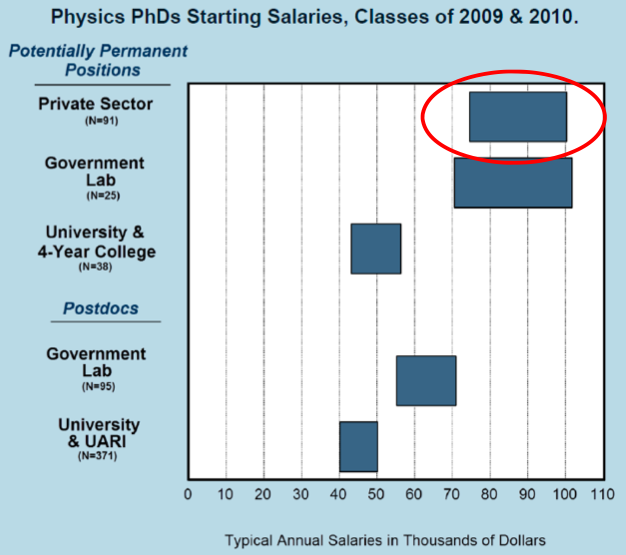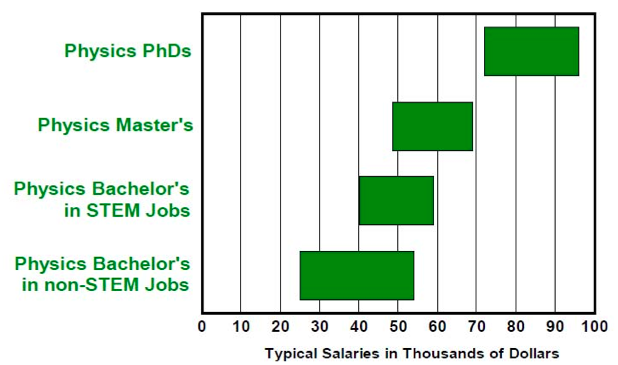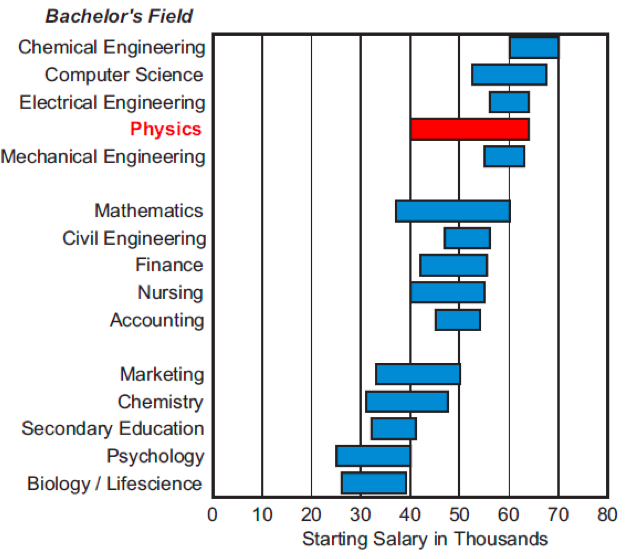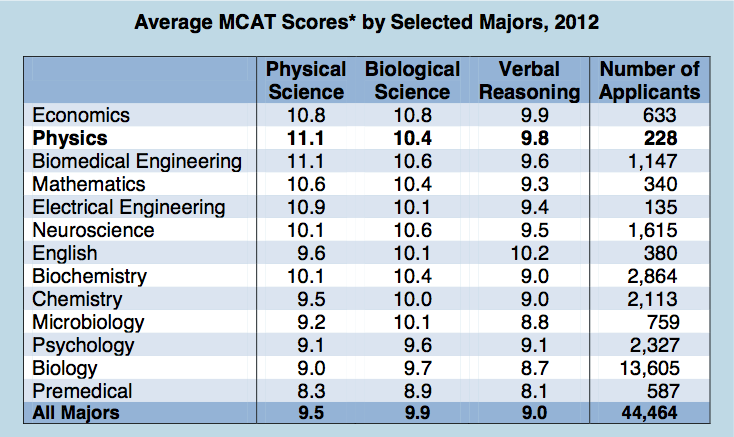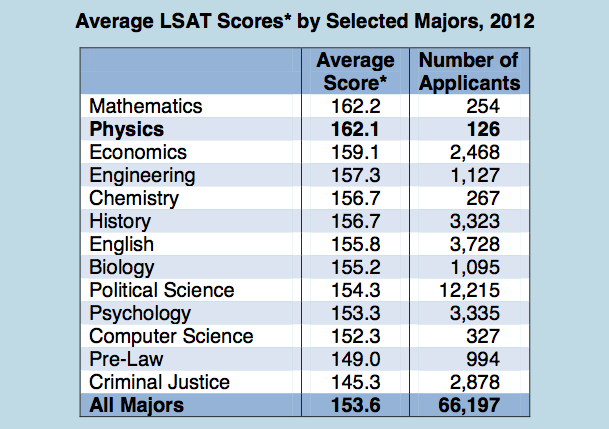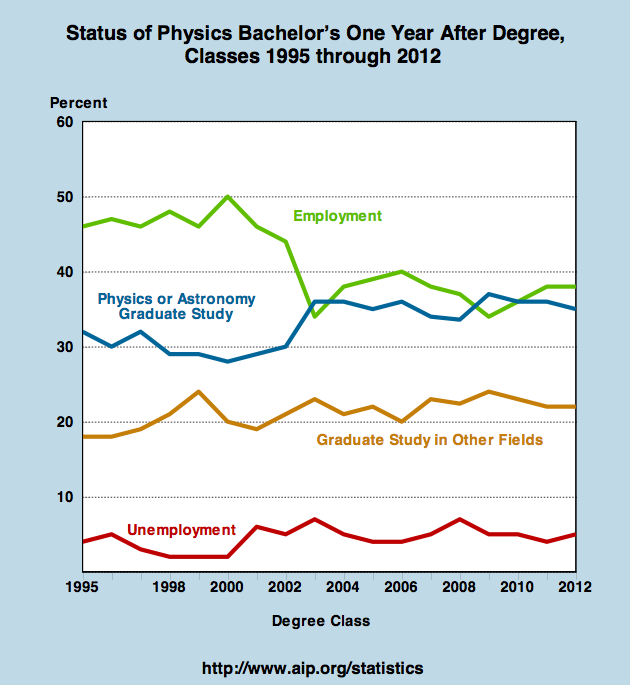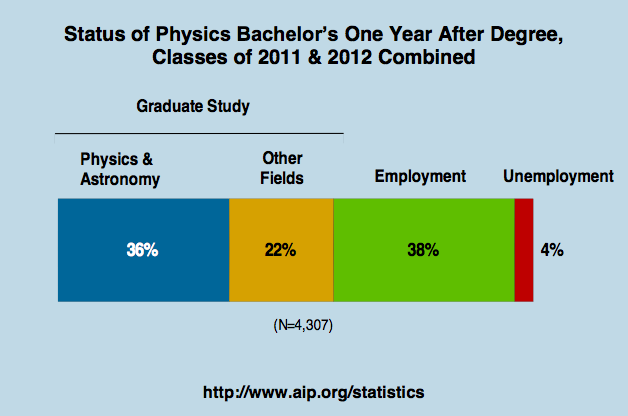Careers & Job Postings
The Canadian Association of Physicists maintains a site for Careers.
Physics Today, is the membership magazine of the American Institute of Physics. The careers web site and resources are extensive.
If you wish to discuss a career in physics, please come and talk to one of our faculty members.
The UofR is a full member of TRIUMF. Please visit the TRIUMF site to view coop opportunities.
See also career opportunities at the University of Regina.
Think there are no careers for physicists? Think again.
Read an excellent presentation on the Real Story About Employment of Physics PhDs (2.4 MB) ![]() format.
format.
Salary charts are courtesy of Crystal Bailey, American Physics Society (www.aps.org/careers).
What career options will I have?
Students, their parents and the general public alike often wonder what sort of job can a Physicist get upon graduating from university. Many know that Physicists often pursue an academic path for their career, but most are unaware that there are a myriad of other jobs for which a Physicist is well prepared. Physicists end up in all sorts of interesting jobs and are virtually never unemployed, because of their broad training and adaptability. In particular they are needed at the start of new technologies and machines, or in particularly challenging projects such as space missions, remote explorations, and failure assessment. As a working physicist you may find yourself: trying to predict the stock market on Wall Street, testing satellites for space missions, developing new materials for industry, developing new electronic devices and components, doing medical physics in a hospital, teaching the next generation of physicists in a high school, trying to predict the next major earthquakes to hit San Francisco or Japan, developing flight simulation software, optimizing industrial manufacturing or transformation processes, developing a new measurement instrument, performing materials testing and characterization for special applications, launching a new software company or product, performing urban planning and optimization, etc.
There is a shortage of physicists in almost all parts of Canada, and this situation will become even more acute in the next decade. And even if you wish to pursue another career, getting a Physics degree gives you an edge in national or international examinations.
What is the employment situation?
Studies and statistics on the employment of Canadian physics graduates of all levels confirm that physicists experience very low levels of unemployment. One reason appears to be that they find many paths to a fulfilling career available to them, and not just those paths to the traditional physics related workplace. An AIP study focused on M.Sc. recipients has reached a similar conclusion. Regardless of where physicists find themselves working, they value their educational experience highly, as has been shown by both this study and the aforementioned AIP study. Several authors have argued convincingly that physicists are able to contribute the skills and/or modes of thought provided by their physics education to areas not normally associated with physics. Our own results show that physicists are also well paid, but we are not able to make comparisons between the salaries of physicists and that of those associated with related scientific disciplines in Canada. However, American data show that physicists in the United States are the best paid among those in the physical and natural sciences in that country which provides objective confirmation of the high value placed on their education by physicists themselves.
However, similar trends have been identified elsewhere, and they have been the subject of much discussion. ``Physicists tend to ....approach an application in terms of a few physical principles that can integrate and synthesize what often appear as unrelated aspects of a problem.'' (John Rigden in the Industrial Physicist.) ``.....physicists have a universal goal of understanding deeply whatever they are studying......Professionals from other disciplines, by contrast, do not share this goal...'' (Joseph Pimbley in Physics Today.) ``Employers are willing to pay premium salaries to gain the problem-solving skills physicists are able to apply to their companies' needs.'' (Brian Schwartz in APS News.) These are clearly subjective opinions but they invite further study into the role of physicists in non-physics related places of employment.
Our findings have implications for the education of physicists. If 40% of physics graduates find themselves using their physics background, but not in a physics related job environment, perhaps more attention should be given in their education to the application of the reasoning processes of physics to non-physics applications. Perhaps physicists could be even better prepared to integrate themselves into those non-science environments to which they bring their unique perspectives.
Although physics undoubtedly attracts individuals who enjoy problem solving and who seek deep understanding not only of nature but of any problem to which they wish to apply themselves, the value of such individuals to society is nurtured by their exposure to the rigour of a traditional post-secondary physics education at both the graduate and undergraduate level. Joseph Pimbley summarizes ``Four decades ago, a liberal arts education was thought to prepare one well for any professional endeavour.....Physics is the liberal arts education for a technological society''. We strongly recommend physics as a choice for post-secondary education to any student.
And the employment numbers are impressive for Physics graduates.
More information
For more information please visit the APS Careers site.


